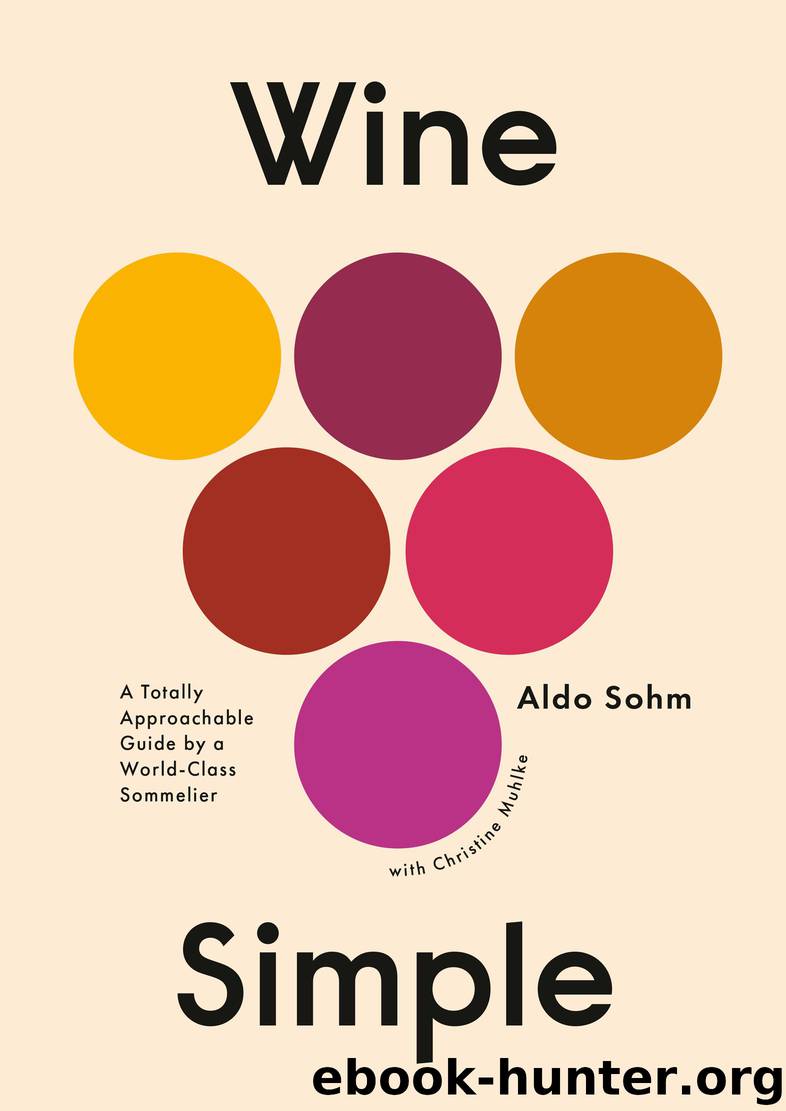Wine Simple by Aldo Sohm & Christine Muhlke

Author:Aldo Sohm & Christine Muhlke
Language: eng
Format: epub, mobi
Publisher: Potter/Ten Speed/Harmony/Rodale
Published: 2019-11-18T16:00:00+00:00
Nothing divides wine drinkers today like natural wine. Even nonprofessionals have such strong opinions; the topic borders on political, with rabid factions on the right and left. Me? I have to confess that I was always critical of natural wine. As much as I respect the men and women making it, as well as the taste and opinions of my peers and young sommeliers who are in favor of it, the volatility (volatile acids) that causes the flavors to change quickly; the ciderish, kombucha-like flavors; that aroma of mouse cage that you sometimes get—none of these aspects are what excite me about wine. It is an interesting trend, and I’m eager to observe how these wines develop.
As defined on this page, natural wine is wine from organically and/or biodynamically farmed grapes that’s bottled in small quantities by free-spirited producers (what I love most about it).
Nothing is added or removed in the making of the wine. None of the chemical additives or processing aids frequently employed by conventional winemakers throughout all steps of the winemaking process come into play, and the juice is allowed to ferment using naturally occurring yeast with minimal—ideally no—intervention, such as filtration. What goes into the bottle is considered a living, untainted organism, perfect in its imperfections.
One of the natural camp’s biggest arguments against mainstream winemaking is the addition of sulfur dioxide (SO2). What’s not talked about is that sulfites result naturally in any fermentation process. You can also find them in apples, green asparagus, and dried fruit. They’re even in french fries! To add a touch of sulfur before bottling is, so far, the best way of preserving wine and ensuring that the bottles can ship worldwide. The sulfur binds yeast, oxygen, pigments, sugars, and other compounds that can have a negative impact on wine over time. It also allows it to age gracefully. (The belief that sulfites give you a headache is a myth, by the way. What really causes headaches are biogenic amines such as histamines and tyramine, or the overconsumption of alcohol. No way around that!)
Unsulfured wines have a touch more generous fruit and will appear to be more drinkable on glasses one and two. However, the fruit starts to taste wilted the longer the bottle stays open. I talked about this with Jean-Louis Dutraive from Domaine de la Grand’Cour, one of the absolute stars of Beaujolais and a person full of life. He said that he fills some bottles without SO2 for his personal consumption but finds that the last glass is not the best.
It’s this inconsistency that causes me to be critical of natural wines: As someone whose livelihood—and those of his staff—is dependent on the happiness and return visits of his customers, it’s hard for me to champion a wine that can behave erratically from one glass to the next.
I also take issue with the fact that the kombucha-like character of some natural wines obscures what grape it was made from. I recently served my coauthor, Christine, and her friends a natural sauvignon blanc.
Download
This site does not store any files on its server. We only index and link to content provided by other sites. Please contact the content providers to delete copyright contents if any and email us, we'll remove relevant links or contents immediately.
101 Whiskies to Try Before You Die by Ian Buxton(45000)
World's Best Whiskies by Dominic Roskrow(44897)
Whiskies Galore by Ian Buxton(41983)
Craft Beer for the Homebrewer by Michael Agnew(18229)
Right Here, Right Now by Georgia Beers(4194)
Not a Diet Book by James Smith(3409)
Water by Ian Miller(3174)
The Coffee Dictionary by Maxwell Colonna-Dashwood(3118)
Kitchen confidential by Anthony Bourdain(3078)
Coffee for One by KJ Fallon(2624)
Smuggler's Cove: Exotic Cocktails, Rum, and the Cult of Tiki by Martin Cate & Rebecca Cate(2514)
Superfood Smoothie Bowls: Delicious, Satisfying, Protein-Packed Blends that Boost Energy and Burn Fat by Chace Daniella(2454)
Beer is proof God loves us by Charles W. Bamforth(2450)
Talking as Fast as I Can by Lauren Graham(2435)
A Short History of Drunkenness by Forsyth Mark(2283)
Bourbon: A Savor the South Cookbook by Kathleen Purvis(2282)
Eat With Intention by Cassandra Bodzak(2193)
Cocktails for the Holidays by Editors of Imbibe magazine(2119)
Colombia Travel Guide by Lonely Planet(2116)
